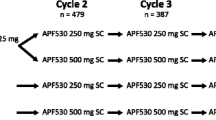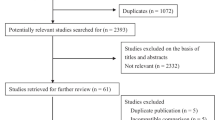Abstract
Purpose
Several trials had independently noted that patients receiving megestrol acetate had less nausea and vomiting, but this antiemetic activity of megestrol acetate has not been reported separately in the literature. Our objective was to evaluate the antiemetic ability of megestrol acetate in patients receiving chemotherapy.
Patients and Methods
Patients receiving chemotherapy were randomly assigned to receive either megestrol acetate 320 mg PO or placebo before the first day of chemotherapy, followed on days 1–4 by megestrol acetate 320 mg PO combined with granisetron 3 mg IV and metoclopramide 20 mg IM or only granisetron 3 mg IV combined with metoclopramide 20 mg IM in a crossover manner during two consecutive cycles. Rates of complete protection against both vomiting and moderate-to-severe nausea was the primary end point.
Results
One hundred patients were enrolled in the study. The antiemetic regimen containing megestrol acetate was superior in providing complete protection from nausea and vomiting (45% megestrol acetate regimen vs.17% no megestrol acetate regimen). Complete response of acute phase in both antiemetic regimens was different (85% megestrol acetate regimen vs. 72% no megestrol acetate regimen). Complete response of delayed emesis was also different (49% megestrol acetate regimen vs. 18% no megestrol acetate regimen). Adverse events were mostly mild to moderate. There were no serious drug-related adverse events between the two antiemetic regimens.
Conclusion
Megestrol acetate was shown to be an effective antiemetic agent. Megestrol acetate might be a new antiemetic option for chemotherapy.
Similar content being viewed by others
References
Schnell FM (2003) Chemotherapy-induced nausea and vomiting: the importance of acute antiemetic control. Oncologist 8:187–198
Glaus A, Knipping C, Morant R et al (2004) Chemotherapy-induced nausea and vomiting in routine practice: a European perspective. Support Care Cancer 12:708–715. doi:10.1007/s00520-004-0662-x
Hesketh PJ, Kris MG, Grunberg SM et al (1997) Proposal for classifying the acute emetogenicity of cancer chemotherapy. J Clin Oncol 15:103–109
Osoba D, Zee B, Warr D et al (1997) Effect of postchemotherapy nausea and vomiting on health-related quality of life. The Quality of Life and Symptom Control Committees of the National Cancer Institute of Canada Clinical Trials Group. Support Care Cancer 5:307–313
Grunberg SM, Deuson RR, Mavros P et al (2004) Incidence of chemotherapy-induced nausea and emesis after modern antiemetics. Cancer J 100:2261–2268. doi:10.1002/cncr.20230
Gralla RJ (1991) Controlling emesis in patients receiving cancer chemotherapy. Recent Results Cancer Res 121:68–85
Gralla RJ, Tyson LB, Kris MG et al (1987) The management of chemotherapy-induced nausea and vomiting. Med Clin N Am 71:289–301
Kris MG, Hesketh PJ, Somerfield MR et al (2006) American Society of Clinical Oncology guideline for antiemetics in oncology: update 2006. J Clin Oncol 24:2932–2947. doi:10.1200/JCO.2006.06.9591
Roila F, Hesketh PJ, Herrstedt J (2006) Prevention of chemotherapy- and radiotherapy-induced emesis: results of the 2004 Perugia International Antiemetic Consensus Conference. Ann Oncol 17:20–28. doi:10.1093/annonc/mdj078
Kaiser R, Sezer O, Papies A et al (2002) Patient-tailored antiemetic treatment with 5-hydroxytryptamine type 3 receptor antagonists according to cytochrome P-450 2D6 genotypes. J Clin Oncol 20:2805–2811
Goodwin JW, Green SJ, Moinpour CM et al (2008) Phase III randomized placebo-controlled trial of two doses of megestrol acetate as treatment for menopausal symptoms in women with breast cancer: Southwest Oncology Group Study 9626. J Clin Oncol 26:1650–1656. doi:10.1200/JCO.2006.10.6179
Hedley D, Dalgleish A, Raghavan D et al (1984) Advanced breast cancer: response to high dose oral medroxyprogesterone acetate. Aust N Z J Med 14:251–254
Loprinzi CL, Schaid DJ, Dose AM et al (1993) Body-composition changes in patients who gain weight while receiving megestrol acetate. J Clin Oncol 11:152–154
Tomiska M, Tomiskova M, Salajka F et al (2003) Palliative treatment of cancer anorexia with oral suspension of megestrol acetate. Neoplasma 50:227–233
Loprinzi CL, Ellison NM, Schaid DJ et al (1990) Controlled trial of megestrol acetate for the treatment of cancer anorexia and cachexia. J Natl Cancer Inst 82:1127–1132
Tchekmedyian NS, Hickman M, Siau J et al (1992) Megestrol acetate in cancer anorexia and weight loss. Cancer 69:1268–1274
Rowland KM Jr, Loprinzi CL, Shaw EG et al (1996) Randomized double-blind placebo-controlled trial of cisplatin and etoposide plus megestrol acetate/placebo in extensive-stage small-cell lung cancer: a North Central Cancer Treatment Group study. J Clin Oncol 14:135–141
Jatoi A, Windschitl HE, Loprinzi CL et al (2002) Dronabinol versus megestrol acetate versus combination therapy for cancer-associated anorexia: a North Central Cancer Treatment Group study. J Clin Oncol 20:567–573
Wood L, Palmer M, Hewitt J et al (1998) Results of a phase III, double-blind, placebo-controlled trial of megestrol acetate modulation of P-glycoprotein-mediated drug resistance in the first-line management of small-cell lung carcinoma. Br J Cancer 77:627–631
Berenstein EG, Ortiz Z (2005) Megestrol acetate for the treatment of anorexia-cachexia syndrome. Cochrane Database Syst Rev. doi:10.1002/14651858.CD004310.pub2
Dev R, Del Fabbro E, Bruera E (2007) Association between megestrol acetate treatment and symptomatic adrenal insufficiency with hypogonadism in male patients with cancer. Cancer 110(6):1173–1177. doi:10.1002/cncr.22924
Levitan N, Dowlati A, Craffey M et al (1998) A brief intensive cisplatin-based outpatient chemotherapy regimen with filgrastim and megestrol acetate support for advanced non-small cell lung cancer: results of a phase II trial. Lung Cancer 22(3):227–234. doi:10.1016/S0169-5002(98)00087-7
Acknowledgements
This work would not have been possible without the dedication of the cancer center data manager of West China Hospital, the nursing stuff and, above all, the patients who filled in their questionnaires and sent them for evaluation.
Author information
Authors and Affiliations
Corresponding author
Rights and permissions
About this article
Cite this article
Zang, J., Hou, M., Gou, H.F. et al. Antiemetic activity of megestrol acetate in patients receiving chemotherapy. Support Care Cancer 19, 667–673 (2011). https://doi.org/10.1007/s00520-010-0886-x
Received:
Accepted:
Published:
Issue Date:
DOI: https://doi.org/10.1007/s00520-010-0886-x




